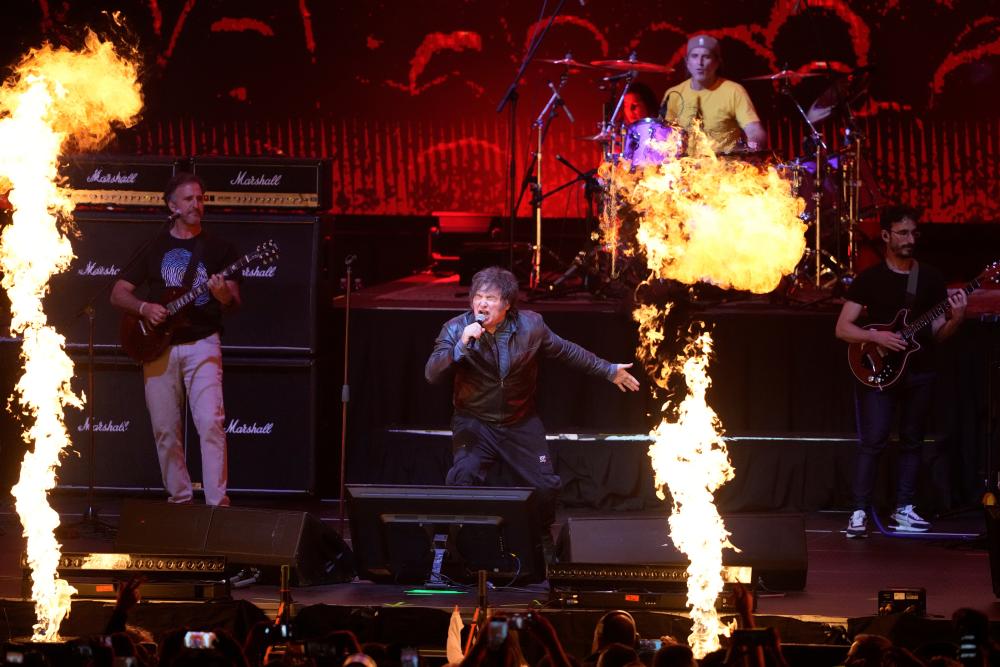Argentina’s “rock star president” Javier Milei has been struggling to get much satisfaction of late, as his pledge to lead the country into a new era of prosperity foundered amid a wave of economic strife, scandal and public discontent.
But on Monday night the scruffy haired South American populist – the former frontman in a Rolling Stones tribute band – took to the stage in Buenos Aires hoping to sing his way out of the funk.
“Olé, olé, olé, olé! Milei! Milei!” thousands of die-hard supporters chanted as the 54-year-old libertarian kicked off a concert at the city’s Movistar Arena – a 15,000-seat venue which has previously hosted rockers including Liam Gallagher, Judas Priest and Megadeth.
Milei basked in the adulation, throwing his leather-clad arms into the air, and took a sip of water before proceeding with his nine-track set of mostly 1980s rock anthems. “I’m human,” he told the packed stadium. “It might not seem like it, but I am.”
Milei won power almost two years ago, vowing to save his country’s notoriously haywire economy by “exterminating” inflation and taking a metaphorical chainsaw to state spending. “Just as the fall of the Berlin Wall marked the end of a tragic era for the world, these elections represent a tipping point in our history,” the Mick Jagger-impersonating crooner-turned politician declared as he took office in December 2023.
For a while Milei’s ferocious austerity campaign appeared to be working – for some people at least – with the president’s success in taming triple-digit inflation drawing international plaudits.
Donald Trump celebrated Milei’s quest to “Make Argentina Great Again”. The Tory party leader, Kemi Badenoch, said she hoped to become a British version of Argentina’s president. The conservative historian Niall Ferguson flew to Buenos Aires to interview Argentina’s president and celebrate the “stunning recovery” his “shock therapy” had produced.
“With his shaggy sideburns and loopy facial expressions, there is more than a hint of the Mad Hatter about him,” Ferguson wrote in July. “[But] Milei is delivering a man-made miracle that should gladden the heart of every classical economist and quicken the pulse of all political libertarians.”
In recent weeks, however, the wheels appear to have come off Milei’s revolution. Doubts over his political future have spooked markets and triggered a sharp sell-off of its currency, the peso, with the government depleting its scarce international reserves in order to contain that run.
In August, Milei was pelted with stones by protesters amid growing public anger over a corruption scandal involving one of the most powerful people in his administration: his sister and chief-of-staff, Karina Milei.
In September, Milei’s La Libertad Avanza party suffered a humiliating defeat in the provincial election in Buenos Aires – where nearly 40% of Argentina’s population lives – and there are fears among Mileistas that their candidates could receive a similar drubbing in nationwide midterms at the end of this month.
On Sunday, a close Milei ally, José Luis Espert, was forced to pull out of that election after he was forced to admit that he had received a $200,000 payment from an alleged drug trafficker.
“[Milei] is in a deep crisis: of governance, of the presidency itself, of popular support, of his ability to connect with young people,” said Sebastián Lacunza, the journalist who broke that scandal.
Lacunza said he believed support was rapidly draining away from Milei as a result of questions over his ethics, as well as the human consequences of his drastic spending cuts. “The ‘chainsaw’ cuts have hit sensitive areas: pensioners’ incomes, top public paediatric hospitals, universities, and households facing soaring costs for utilities and food.”
The crisis is so severe that last month Trump stepped in with an emergency bailout of up to $20bn, with the US president declaring: “We’re backing him 100% – we think he’s doing a fantastic job.”
Even Milei loyalists who flocked to Monday’s show admitted Argentina was in dire straits. “The country is a shambles. We’re not going to say it’s great – it’s a shambles,” said Oscar Luis Osorio, a 54-year-old shopkeeper who came dressed as a lion.
“But we have to wait,” Osorio added, pointing out that Milei was less than half-way through his four-year term.
Emanuel Lacuadra, a 27-year-old gig worker and student, shrugged off the Espert scandal. “I support the government almost unconditionally. There are many in the opposition who will try everything to bring it down, but for my part, I’ll always support it,” Lacuadra said, calling Milei’s presidency “a historic, unique moment – not only for Argentina but for the world”.
Analysts paint a far less rosy picture of Milei’s predicament as he nears the start of his third year in power.
“I would describe him as a president in economic, political, and social default,” said Paola Zuban, a political scientist and co-director of the polling firm Zuban Córdoba.
Zuban recalled how Milei won power in 2023 promising not only an economic revolution, but a moral one too, with his pledges to combat deceitful elites he called “la casta” (the caste). That message had been severely undermined by the recent scandals involving his close allies.
“With these corruption scandals, that moral bond has been broken. Expectations have fallen, trust has eroded, and that’s what has triggered this major crisis the government is facing today – one I believe it has little chance of recovering from,” Zuban said.
Facundo Nejamkis, the director of the consulting firm Opina Argentina, described “a growing dissonance between how the government presents itself and the reality people live”. “The government talked about a ‘miracle’ that no Argentine can see in their daily life,” he added.
Nejamkis saw Monday’s concert as an attempt to revive Milei’s faltering movement. But outside the area, even fervent Milei supporters wondered whether it was a wise move, given the headwinds buffeting their cause.
“It seems ill-timed, at the very least,” said one prominent pro-Milei activist, who asked not to be named.

